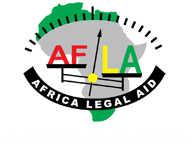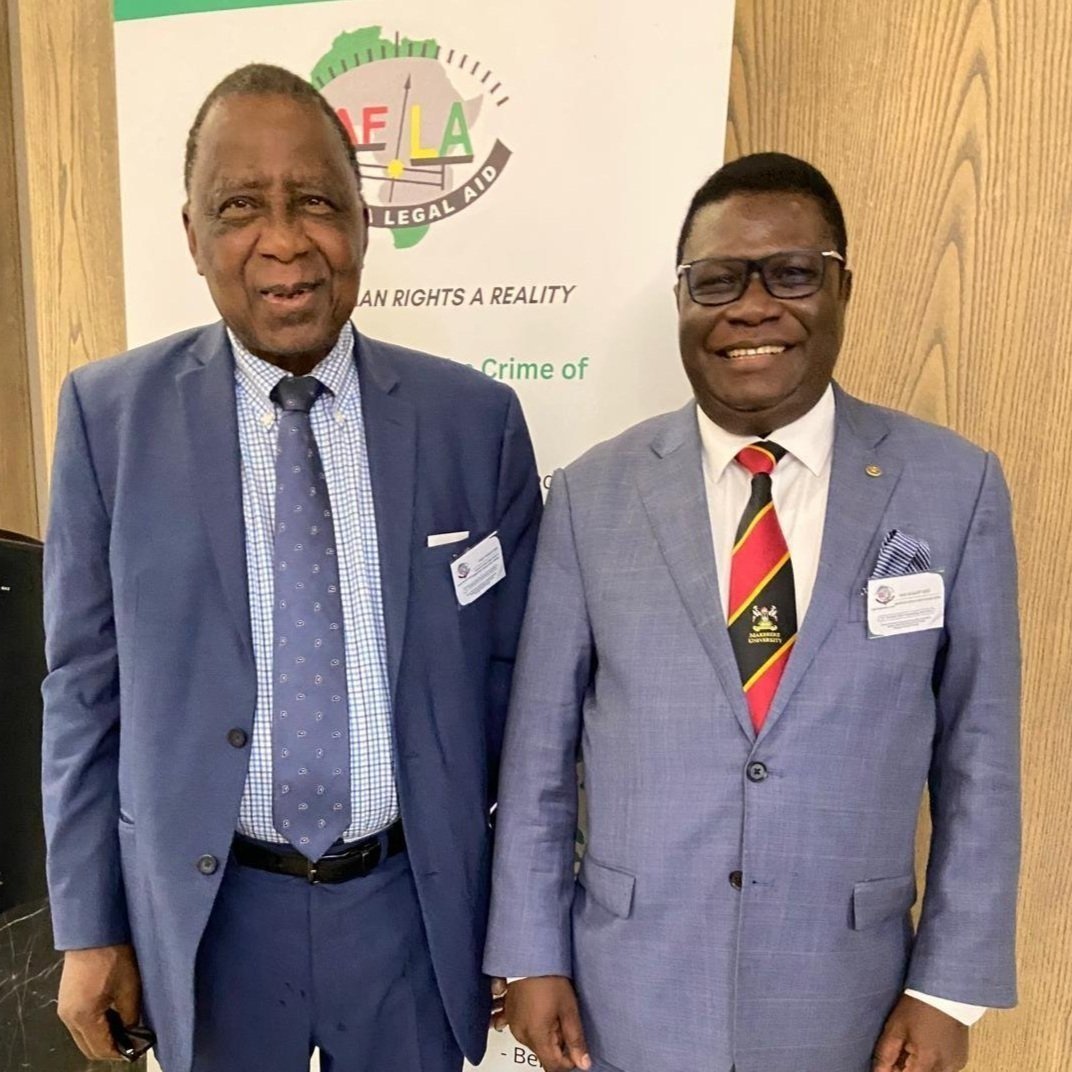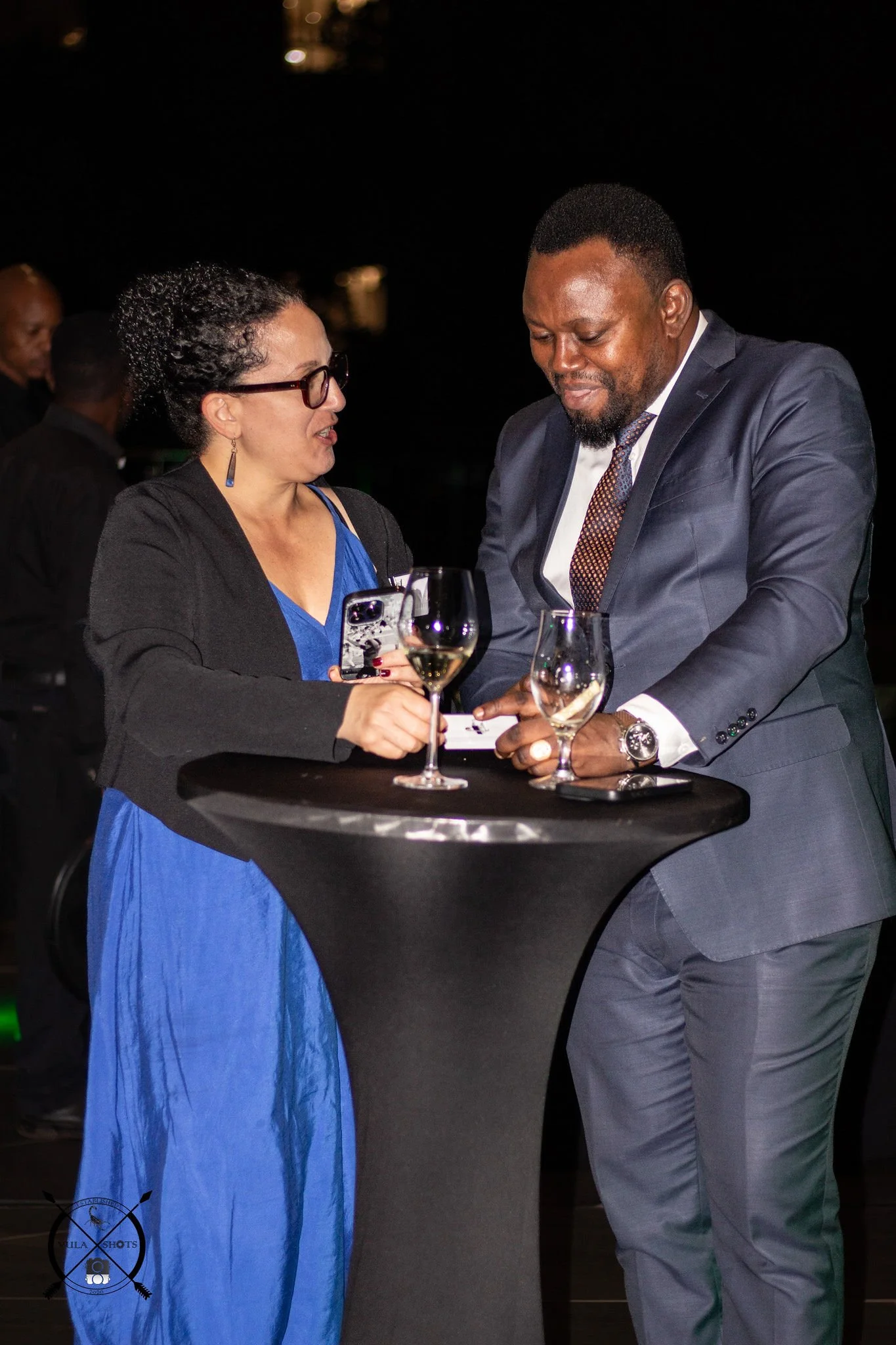Africa Legal Aid Champions the Review of the Kampala Amendments on the Crime of Aggression
In the lead-up to the review of the Kampala Amendments on the Crime of Aggression by the Assembly of States Parties to the International Criminal Court (ICC) in July 2025, Africa Legal Aid (AFLA) mobilised the responsible ministers of African States Parties to the ICC. Our objective is to raise awareness and foster a sense of ownership among these states to advocate for a crime of aggression regime that is both fair and legitimate.
It is important to note that a growing number of non-African States Parties to the ICC, many from Western Europe, support a crime of aggression regime with the same rules applied to the three other core crimes – genocide, war crimes, and crimes against humanity. This is the one of the outcomes we aim to achieve with our intervention.
AFLA convened the Review of the Kampala Amendments on the Crime of Aggression: Mobilising African States Parties to The International Criminal Court (ICC) To Raise Awareness and Generate Ownership, on October 30-31 2024.
Africa Legal Aid - A Leading Voice In International Justice
AFLA’s engagement with international criminal justice began when a Spanish magistrate issued a warrant for the arrest of former Chilean leader Augusto Pinochet in the UK for alleged crimes committed against Spanish nationals in Chile, triggering renewed discussions on universal jurisdiction. AFLA wished to understand what universal jurisdiction would mean for Africa. Would it fill the impunity gap, or would it become a form of judicial imperialism?
In April 2000, AFLA convened a pilot seminar on universal jurisdiction for crimes against humanity at the Maastricht University. This was followed with expert meetings in Cairo and Arusha in 2001 and 2002 respectively, resulting in the adoption of The Cairo-Arusha Principles on Universal Jurisdiction in Respect of Gross Human Rights Offences: An African Perspective under the auspices of AFLA in Arusha in 2002. The Cairo-Arusha Principles have been coined ‘the voice of Africa on universal jurisdiction’.
But even before the adoption of the Cairo-Arusha Principles, the Cairo Draft had gained acceptance and was cited before the International Court of Justice (ICJ) in a landmark dissenting opinion,[1] bringing AFLA’s work to the international judicial landscape. Barely six months after, the Rome Statute of the International Criminal Court (ICC), entered into force on 1 July 2002 sooner than many would have expected. AFLA convened the first major conference to introduce the new ICC to human rights and justice sectors in Africa.[2] Since then, AFLA has spearheaded pioneering and ground-breaking initiatives on international criminal justice.
In July 2025, the Assembly of States Parties (ASP) to the ICC will take a decision on the crime of aggression provisions in the ICC Statute. AFLA supports the calls by a growing number of States Parties and stakeholders to have a crime of aggression jurisdiction with the same rules as the three other crimes: genocide, war crimes and crimes against humanity.
In recognition of AFLA’s leading role and impact, in the lead up to the ASP’s decision on the crime of aggression provisions, AFLA has been supported to mobilise African States Parties to the ICC to create awareness and generate ownership to push for a crime of aggression regime that is fair and legitimate.
AFLA’s pioneering and impactful initiatives on international justice include:
Review of the Amendments on the Crime of Aggression: A Time to Harmonise and Amend, Side Event at the Special Session of the ASP to the ICC on the Review of the Amendments on the Crime of Aggression, New York, 8 July 2025, co-sponsored by the DRC, Ghana, Liberia, Malawi and Switzerland, see here
Review of the Kampala Amendments on the Crime of Aggression: Perspective of African States Parties, Accra, 20-21 May 2025, see here
Review of the Kampala Amendments on the Crime of Aggression: Perspective of African States Parties, Side Event at the 23rd Ordinary Session of the ASP to the ICC, The Hague, 2 December 2024, co-sponsored by Ghana, Malawi, Sierra Leone and Switzerland, see here
Review of the Kampala Amendments on the Crime of Aggression: Mobilising African States Parties to the International Criminal Court (ICC) to Raise Awareness and Generate Ownership, Johannesburg, 29-31 October 2024, see here
Justice Must Happen for The Gambia, Side Event at the 20th Ordinary Session of the ASP to the ICC, 9 December 2021, co-hosted by Uganda and AFLA, see here
AFLA’s launch in 2020 of a Gender Mentoring Training Programme for judges of international courts and tribunals to build the capacity of male and female judges to deliver gender-sensitive and inclusive justice, see here
The following meetings have been held to date:
Seminar on the Use of Artificial Intelligence in International Criminal Courts, held at the Maastricht University, 5 October 2023
User-Generated Evidence Under International Criminal Law, 8 July 2023
Gender Diversity and the Rome Statute System, Side Event at the 21st Ordinary Session of the Assembly of States Parties (ASP) to the International Criminal Court (ICC), The Hague, 6 December 2022, co-hosted by Australia, Uganda, International Gender Champions Den Haag and AFLA, see the summary report here and listen here
Protection of Non-Binary and Intersex People Under the Rome Statute: Opposing View to Dr Rosemary Grey’s Presentation on Non-Binary People and the Rome Statute, 22 October 2022, see here
Non-Binary People and the Rome Statute, 15 May 2022, see here
Gender-Sensitive Judging in International Criminal Courts (ICC), Side Event at the 20th Ordinary Session of the ASP to the ICC, The Hague, 7 December 2021, co-sponsored by Australia, the Netherlands, Uganda and AFLA, see here
Gender-Sensitive Judging in International Criminal Law, 13 November 2021, see here
Gender Issues Concerning Approaches to Female Counsels, 29 May 2021, see here
Gender Issues Concerning Approaches to Female Witnesses, 27 February 2021, see here
Discussion on Generic Recommendations in the Independent Expert Review (IER) Report of the International Criminal Court and Rome Statute System, 5 December 2020, see here
Inaugural Meeting, Gender Mentoring Training Programme for Judges of International Courts and Tribunals, Zoom, 14 November 2020, see here
Justice for Victims of Rights Violations and Sexual Violence in The Gambia, Side Event at the 18th Ordinary Session of the ASP to the ICC, The Hague, 5 December 2019, co-hosted by the Netherlands, Uganda, La Fondation pour l'Égalité des Chances en Afrique, the Women's Initiatives for Gender Justice (WIGJ) and AFLA, see here
Launch of AFLA Quarterly Special Edition 2019 on Lessons from the Gbagbo and Blé Goudé Case & ICC Review, Side Event at the 18th Ordinary Session of the ASP to the ICC, The Hague, 2 December 2019, co-hosted by Ireland, the Netherlands, Uganda and AFLA, see here
Lessons from the Gbagbo and Blé Goudé Case & ICC Review, The Hague, 13 September 2019, in cooperation with the Institute for Security Studies (ISS), supported by the Netherlands Ministry of Foreign Affairs, the Government of Ireland, the Municipality of The Hague and Trust Africa, see here
Complementarity in Action: Bringing Yahya Jammeh to Justice, Side Event at the 17th Ordinary Session of the ASP to the ICC, The Hague, 7 December 2018, co-hosted by a Australia, Ireland, the Netherlands, United Kingdom, Uganda, La Fondation pour l’Egalité des Chances en Afrique and AFLA, see here
Launch of a special edition of the AFLA Quarterly, Commemorating the 20th Anniversary of the Rome Statute of the International Criminal Court (ICC), Side Event at the 17th Ordinary Session of the ASP to the ICC, The Hague, December 2018, free copy of the Quarterly here
Emerging Trends on Complementarity: Consultations with Stakeholders from Central and East Africa, Kampala, 4-5 July 2018, see the pictorial report here and the narrative report in English and in French
Emerging Trends on Complementarity: Consultations with Stakeholders from West Africa, Banjul, 25-26 April 2018, in cooperation with the Attorney General's Chambers and Ministry of Justice of The Gambia, see the pictorial report here and the narrative report in English and in French
Victims of Hissène Habré - The Struggle for Reparations Continues, Side Event at the 16th Ordinary Session of the ASP to the ICC, New York, 7 December 2017, in cooperation with Human Rights Watch, Association Tchadienne pour la Défense des Droits de l’Homme and Redress, with the support of the Federal Department of Foreign Affairs of Switzerland, see here
Carrying Forward the Legacy of the Extraordinary African Chambers in the Habré Trial: An African Solution to an African Problem, Side Event at the 29th Ordinary Session of the Assembly of Heads of State and Government of the African Union, Addis Ababa, 3-4 July 2017, in cooperation with the Commission of the African Union, see the pictorial report here and the narrative report here
ICC Withdrawals: Is Africa Running Away from Justice?, AFLA and Southern Africa Litigation Centre (SALC), Side Event at the 15th Ordinary Session of the ASP, The Hague, 18 November 2016, in cooperation with the Southern Africa Litigation Centre, see here
The Hague Commemorates AFLA Book on The International Criminal Court and Africa: One Decade On, The Hague, 26 October 2016, AFLA and the Permanent Representative to the ICC and OPCW of the Kingdom of the Netherlands, see here
Complementarity, the Hissène Habré Trial, and the Evolution of Universal Jurisdiction, Dakar, 30 May -1 June 2016, in cooperation with the Baltasar Garzon International Foundation (FIBGAR) and the Kenya Human Rights Commission, see the pictorial report here and the narrative report here
Universalizing the Rome Statute of the International Criminal Court, Johannesburg, 18-19 May 2015, see here
Kampala Amendments on the Crime of Aggression: Has Africa Lost its Voice? Informal Reception, The Hague, 1 April 2015
Cooperation, Defence Perspectives, and Clarifying the Immunity Debate, Side Event at the 13th Session of the ASP to the ICC, New York, 12 December 2014, in cooperation with the Kenya Section of the International Commission of Jurists (ICJ Kenya) and sponsored by Ghana and The Netherlands, see here
Africa and the International Criminal Court (ICC): Lessons Learned and Synergies Ahead, Johannesburg, 9-10 September 2014, in cooperation with ICJ Kenya and the Division for Internationalisation at the University of Johannesburg, see the pictorial report here and the narrative report here
Taking the Higher Ground in the Debate on the ICC and Africa, Side Event at the 12th Ordinary Session of the Assembly of States Parties to the International Criminal Court, The Hague, 22 November 2013, see here
Africa and the ICC: Engaging North African and Francophone Countries, Tunis, 14-15 November 2013, in cooperation with Arab Institute of Human Rights and Avocats Sans Frontières Suisse, see the pictorial report here and the French narrative report here
Africa and the ICC: 10 years On, Arusha, 28 February-1 March 2013, in cooperation with the International Legal Assistance Consortium (ILAC), the Commonwealth Secretariat, the International Bar Association (IBA) and with the support of the International Criminal Tribunal for Rwanda (ICTR), see here
The International Criminal Court (ICC) in a Politically Divided World, Gaborone, 21-22 October 2011, in cooperation with the Commonwealth Secretariat and the International Legal Assistance Consortium (ILAC), see here
European Union Support for the International Criminal Court - Facing Challenges and Overcoming Difficulties: An African Perspective, European Parliament in Brussels, 12 July 2011, see here
Africa and the ICC: Complementarity in ICC Situation Countries, Nairobi, 3-4 December 2010, in cooperation with ICJ Kenya and the Institute for Security Studies, see here
The Al Bashir Arrest Warrant: The World vs. Africa or the African Union vs. The People of Africa, The Hague, 26 April 2010, see here
On the Shores of Lake Victoria: Africa and the International Criminal Court (ICC), Side Event at the Review Conference of the Rome Statute of the International Criminal Court (ICC), Kampala, 28 May 2010, see here
Africa Legal Aid at the Review Conference of the Rome Statute of the ICC, Kampala, May/June 2010, see here
Gender Forum: Breaking the Silence, Commemorating International Day on Elimination of Violence against Women, The Hague, 24-25 November 2009, see here
Adopting a Holistic Approach to Gender Justice, Dakar, 6-7 March 2009, in cooperation with the International Criminal Tribunal for Rwanda (ICTR), see here
Gender Justice Forum, The Hague, 7-8 July 2008, in cooperation with the ICTR and the Women’s Initiatives for Gender Justice, see here
The Interface between Peace and International Justice in Africa, Accra, 22-23 June 2007
Africa and the International Criminal Court (ICC), Pretoria, 31 May 2007
African Perspectives on International Criminal Justice, Accra, October 2005
North-South Aspects of International Justice and the International Criminal Court, Maastricht, 7-8 April 2005
Pan African Judicial Colloquium, Johannesburg, 19-20 November 2004
The International Criminal Court and Africa, Accra, 24-25 October 2003
Second Experts’ Meeting: Universal Jurisdiction for Crimes Against Humanity: An African Perspective, Arusha, 18-21 October 2002, see the Cairo-Arusha Principles on Universal Jurisdiction in Respect of Gross Human Rights Offences here
Symposium on Universal Jurisdiction, Maastricht, 7 December 2001
Experts’ Meeting: Universal Jurisdiction for Crimes Against Humanity: African Perspectives, Cairo, 30-31 July 2001
Universal Jurisdiction for Crimes Against Humanity, Maastricht, 18 April 2000
Litigating Economic and Social Rights in African, Accra, 15-17 April 1999
The Legal Profession and the Protection of Human Rights in Africa, Maastricht, 27-29 November 1997
[1] https://www.icj-cij.org/case/121.
[2] Held in Accra, in October 2003.














